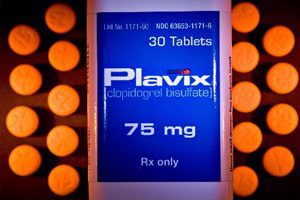
A recent study of Plavix (clopidogrel) revealed high platelet reactivity after stenting. The study found that patients taking Plavix, who were also taking aspirin, experienced poor responses to the therapy. Stents are tiny wire-mesh tubes used to prop open arteries after doctors clear the arteries of blockages. Patients experienced a 2.49-fold increased risk of suffering […]
 A recent study of Plavix (clopidogrel) revealed high platelet reactivity after stenting. The study found that patients taking Plavix, who were also taking aspirin, experienced poor responses to the therapy.
A recent study of Plavix (clopidogrel) revealed high platelet reactivity after stenting. The study found that patients taking Plavix, who were also taking aspirin, experienced poor responses to the therapy.
Stents are tiny wire-mesh tubes used to prop open arteries after doctors clear the arteries of blockages.
Patients experienced a 2.49-fold increased risk of suffering from stent thrombosis (a blood clot forming on the stent) and a 42 percent increased risk of heart attack, according to MedPage Today. The risks are considered statistically significant, according to Gregg W. Stone, MD, of Columbia University Medical Center in Manhattan, and colleagues. The researchers reported in the journal The Lancet and presented the results at last year’s Transcatheter Cardiovascular Therapeutics meeting. The one-year result were derived from the ADAPT-DES registry.
The resent research builds on the negative 30-day findings from the registry, as well as two failed clinical trials involving platelet function testing, MedPage Today reported. ADAPT-DES involved 8,583 consecutive patients at 11 United States and German sites who received both aspirin and Plavix after being implanted with one or more drug-eluting stents.
Matthew J. Price, MD, of the Scripps Clinic and Scripps Translational Science Institute in La Jolla, California noted in an accompanying editorial that study results “are biologically relevant, are associated with important clinical outcomes such as stent thrombosis, and have prognostic utility,” according to MedPage Today.
Because platelet reactivity on aspirin did not correlate with stent thrombosis, myocardial infarction, or death, “this raises questions as to the utility of aspirin in patients treated with drug-eluting stents,” study lead Stone pointed out in a statement, according to MedPage Today. “An adequately powered randomized trial is required before withholding aspirin in drug-eluting stent-treated patients (with or without chronic oral anticoagulation) can be recommended,” the researchers cautioned.
Plavix, an anti-platelet medication approved in the United States in 1997, is prescribed to reduce risks of atherosclerotic events such as blood clot, stroke, and heart attack in patients with a history of these conditions. We previously wrote that Plavix maker, Sanofi SA, was being probed by federal officials over its disclosures to the U.S. Food & Drug Administration (FDA) concerning the blood thinner. Plavix is co-marketed with Bristol-Myers Squibb Co.
We also previously wrote that prior research raised some doubts about the usefulness of Plavix in preventing a recurrent stroke. The study, published in The New England Journal of Medicine, found that the combination of Plavix and aspirin is no better at preventing second strokes in people who’ve suffered a previous lacunar stroke, when compared to aspirin alone. The addition of Plavix to an aspirin regimen also increased the likelihood of serious gastrointestinal bleeding and death, according to the study.
Meanwhile, Plavix lawsuits continue to mount. In fact, one Plavix lawsuit was filed on behalf of 64 Plavix patients who alleged bleeding side effects. That group claims it suffered strokes and heart attacks after taking Plavix and also alleged the drug can cause heart attacks, internal bleeding, strokes, blood disorders, or death. This is just one of a number of lawsuits filed over Plavix adverse reactions.
In 2010, the FDA added a black box warning to the Plavix label after it found that about three percent of the U.S. population is unable to properly metabolize the drug. The agency cited research that suggest that clopidogrel, which is sold as the brand Plavix, is less efficacious in some patients because of the way in which Plavix must be metabolized.


